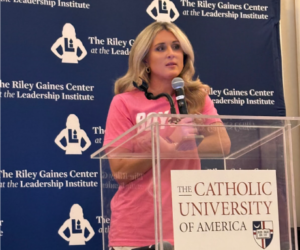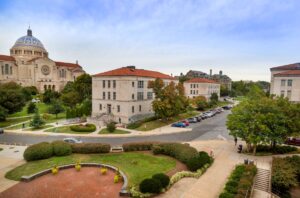Dean of Students Discusses CUAllies, Guns, and Sexual Assault on Campus
By John Connolly
The Student Government Association (SGA) held its first hearing on Monday, October 26, questioning members of the Dean of Students office on various issues.
Chairwoman Kristina Pinault and other members of the Committee on Student Life discussed issues such as housing, sexual assault, and CUAllies with Deans Jonathan Sawyer, Kathryn Jennings, Heidi Zeich, Amy Kerr, Stephanie Davey, and assistant Julie Mullen for nearly two hours in the Great Room of the Edward J. Pryzbyla Center.
Monday’s hearing demonstrated one of the new processes of SGA. During the hearing, senators on the Student Life committee asked questions of the various deans, to gain a better understanding of what exactly the Dean of Students office does.
At the start of the hearing, Chairwoman Pinault requested questions from both SGA senators and from students. Those present were able to write down questions and pass them to the rostrum where a senator would question either one or all of the deans present. According to Pinault, there was “a decent response” from students.
During the hearing, much of the discussion focused on the push to recognize CUAllies as a student organization on campus. When questioned about the previous denial of recognition, Dean Jennings reiterated that the decision does not come from just one person but that it is a team effort.
Jennings explained to the panel “most of what any of us do, in any of our roles, are not made in a bubble, or decided on by just us. That is part of the reason why we are a team in the Dean of Students office. We discuss decisions and talk through decisions as a whole.”
Jennings noted that in 2012, both her and Dean Sawyer “were actively involved” and met with other members of the administration when making the CUAllies decision. She did explain that, in the end, the decision fell to her as the Director of Campus Activities.
When asked on the reason why CUAllies was previously denied recognition, Jennings explained that the group was more focused on advocacy instead of support.
Dean Sawyer also explained that much else was occurring at the time of the 2012 decision.
“We had just signed the University Pledge. So we were working, as a university, towards aspects of what the Allies were not asking us to accomplish,” said Sawyer. “Their was a big meeting with a lot of University officials, including the president, where we had a dialogue about the ways to work with the group at the University…and those conversations have continued on an annual basis, but not always with the Allies.”
When asked on how the University would go about possibly accepting this changed mission, Jennings said, “I would have to see their constitution and what they are supplying as their organizational request.”
Briana Bee, president of CUAllies, said the group has revised its mission.
“My goal is to redirect the conversation to the future and stop the hostility that has taken place previously,” said Bee. She also noted that the mission calls for “equal representation and treatment of all LGBTQ students by providing support and a safe environment on campus.”
Jennings also made clear that a conversation on what exactly the group means in terms of support. “We don’t want to offer support in the organization that’s not the right kind of support.” Jennings also explained, “the right place might be professional support who can work with students on…their transition here.”
Stephen Morris, also of CUAllies, said, “the meeting was a great indication of the emerging support from the student body.” He also said he looks forward to a dialogue with the administration.
Amongst the other issues discussed during the hearing included the process of how students file reports of sexual assault, drug and alcohol education, visitation policies, medical amnesty, and the how student officials are elected, were included.
Chairwoman Pinault, who presided over the hearing, felt that it was very successful.
“I thought it was very productive. Clearly, the deans are not always going to have an absolute answer for us, but they definitely answered to the best of their abilities,” Pinault said. “I was expecting more vague and less detailed answers, but I think they were really engaged with us and wanted to answer our questions…I think it was very educational and informational.”
Student David Fisher also felt that attending the meeting was valuable. “I think they were able to provide a lot of information on what they were asked.” Fisher also said that he thinks, “A setting like this allows students to come in and see that there is change and feedback being provided. And now it’s up to the student government to make sure that change is being provided.” Fisher did feel that an open forum would have drawn more of the public to the hearing.
SGA plans to hold its second hearing, this time, with officials from the Department of Public Safety, soon.







